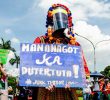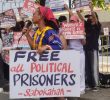CAGAYAN DE ORO CITY, Philippines — As the 5th anniversary of the Marawi Siege is observed Monday, May 23, civil society organizations and displaced residents are giving the Duterte administration and the Task Force Bangon Marawi (TFBM) a “failing mark” with regards to the city’s rehabilitation.
At least two groups, the Reclaiming Marawi Movement (RMM) and the Marawi Advocacy Accompaniment (MAA), have been very vocal in criticizing the efforts exerted by the national government through the TFBM.
In a statement, they said the TFBM claimed the rehabilitation efforts have remained on track and will be completed as promised within the term of Pres. Rodrigo Duterte. But they asserted that internally displaced persons of Marawi have been existing under extremely difficult situations since their evacuation in May 2017.
“There are still unmet needs and issues while they wallow in the camps such as lack of food and livelihood, poor sanitation and hygiene conditions, access of WASH (water, sanitation and hygiene) … basic services, education, and durable solutions. The dire state of the IDPs was further exacerbated during the Covid-19 pandemic,” they said.
RMM and MAA said that as of March 2022, based on UNHCR Mindanao Displacement Dashboard, around 17,067 families or 85,335 individuals belonging to the most affected areas (MAA) in Marawi remain displaced in various locations.
While there are 4,646 families in the different transitory sites, only 2,776 are slated to be placed in permanent shelters being built by the government in Kilala, Gadongan, Dulay West, Dulay Proper, Patani, ARMM Bridge (Saguiran), PABAHAY BARMM, and BARMM Duplex.
RMM and MAA enumerated among others the following challenges: Issue of land conflict and dispossession in Marawi which affects especially four barangays within ground zero; building large-scale public infrastructures which are reportedly unfit to the needs of residents of Marawi; militarization of the entire province of Lanao Sur with the building of military camps; and the critical issue of delivering justice to the innocent victims of the siege who remain unidentified since 2017.
A ‘dismal failure’
RMM and MAA said “the rehab effort is a dismal failure”.
For one, they said, the government has backtracked on its promises and failed at consulting relevant stakeholders on implementing the programs of the rehabilitation. Since the siege, the crisis of prolonged displacement still puts many lives at risk and have deprived the IDPs of their rights as human beings.
Hundreds of Marawi IDPs, until now, remain in temporary shelter communities.
The groups also said Marawi’s reconstruction has an unfolding character of “development aggression” as the city opens to commerce, trade, and tourism. They criticized the national government for “showing the outsiders a new and beautiful Marawi”, but in reality “they are rebuilding the Islamic City the wrong way”.
The national government, they said, is not mindful to their culture, tradition, and beliefs as a people. “They are constructing large-scale infrastructures that the people of Marawi don’t actually need,” they said.
Even though public facilities for the Meranaws were rebuilt, like the barangay complex, schools and hospital, they said the immediate concern of the IDPs of returning to their homes remain unresolved.
The groups asserted that “truth, justice and accountability must be pursued within the transitional justice framework to comprehensively address the roots of the conflict that took place in Marawi 5 years ago.”
RMM and MAA has been advocating since 2017 for a truth telling process on the missing or dead civilians during the Marawi siege and documentation of the dead in the mass grave near Marawi’s MAAs. (davaotoday.com)










